Shared Stories is the final name of a special project funded through an NEH Common Heritage grant. Over the course of 2016, it has had several titles but now as the project is wrapping up, we’ve settled on this name. On Saturday, January 14, 2017, we’ll be holding a special event to celebrate those who have shared their family stories, photographs, scrapbooks and more. To date, we’ve gathering over 8 hours of oral histories and have several more scheduled in the coming weeks and scanned over 1,700 pages of documents. We’ll have speakers sharing their stories (journalist Bea Thompson and Rev. Chris Springs), gospel music, and exhibits. This Around the D will share some of the memories from the oral histories and some of the documents.
Davidson resident Marjean Torrence wrote a weekly column for the Mecklenburg Gazette detailing activities within the African-American communities in Huntersville, Cornelius and Davidson. Many of her columns also were included in scrapbooks.
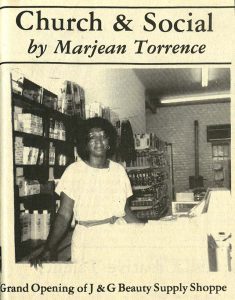
Gloria Kerns at opening of her shop on South Main Street in Davidson.
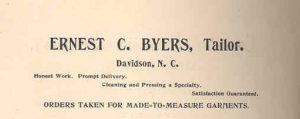
This ad came from the Davidson Monthly almost a century before Torrence’s column.
I graduated from nursing school in 1956. Then after that, I worked at Good Samaritan school for 2 years, on the medical unit. After that, I changed jobs and went to the Physical Rehabilitation Institute in Charlotte and worked there. . . I worked rehab for 36 years. I changed different positions there and my last 15 years at rehab I was in nursing administration. And I did some family education during that time at rehab with families and physically handicapped patients. That was really rewarding. The whole time I was there I enjoyed it, you were always learning something different, some new from working with those people. Erving McClain

A day in Ralph Johnson’s barbershop.
I heard that Mr. Johnson had a opening, so I came here in ’57 and started working for him. . .And then in ’70, I got a job in Charlotte as a salesman, selling cars. Worked there for six and a half years. Ray Skidmore American Motors. Five and have years and then a year in Gastonia, that was in the middle seventies and the economy got bad, the gas prices. And I said, “well, I’m going back to the barber shop.” .. I didn’t keep my license renewed, so I went back to renew the license and I started at Potts Barber Shop in Cornelius and worked there for a number of years; 22 years. And it was good for me, good to me there, too. I enjoyed working with Mr. Potts over there. Seven years ago, in ’93, I decided to come over here and get my own shop. That’s when Norton went out of business. The way it got started was, Mr. Knox came over and said, “Raeford, I’ve got a place available, you would be interested?” I said “Nah,” I wasn’t even going to think about it. And then he said, “Norton’s going out of business,” and I said, “It might be good for me.” And I went by a few days later and we made a deal that same day to get this place.” James Raeford
I even worked for Davidson College. In the library in the serials and documents. That’s in the early 70s. I had worked at the bank, Piedmont Bank and Trust in Davidson. I was one of the first blacks, really I was the first black they hired at Piedmont Bank and Trust. Peggy Rivens
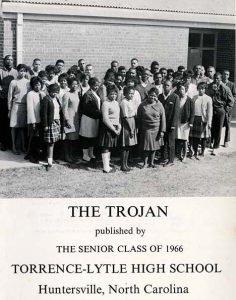
Yearbook staff in 1966 for Torrence-Lytle School – copies of the yearbooks were loaned for scanning.
When I was in school this was grades one through four. The fifth and sixth grades were somewhere, and seventh and eighth, I don’t really know where. In ’53, they added another wing to Huntersville Colored School, and in ’53-54 it became Torrance-Lytle in honor of the men who had lobbied so hard to the county commissioners of Mecklenburg County to obtain a school, because before, if you wanted to further your education from the sixth grade, you had to attend a boarding school in another city, like Salisbury or Kannapolis or Concord. Bee Jay Caldwell
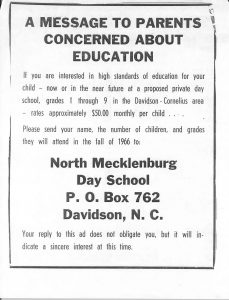
Notice published in the Mecklenburg Gazette in 1965
The courses were reading, writing, arithmetic. Oh, one thing the teachers did try to do was to provide some activities for us. You know how your parents want to come see you perform, so we had plays We had a choir, we had a dance group, we had May Day outside. The higher students, they had oratorical contests. Frances Beale
But one thing, that in the winter time children had to walk so far, when they got to the room their fingers would be almost frozen. The bus, the white bus would pass them, they would be walking. I resent, at an early age I resented getting second-hand books. They would take the books from the white school and send them here. Fortunately, I was helping all the teachers because I was just in the community and I was the first to see the books so I got a good book. But I didn’t like that, I just resented getting those second-hand books. It was very hard for me to deal with. Frances Beale
Sports at Torrence-Lytle – We had some of our equipment from the College, they gave us their used equipment. We had to buy shoes. They gave us their pants. We had a baseball team, we had a basketball team and we had a pretty fair team [given] the conditions. We didn’t have a gym. We didn’t have one in Davidson and we didn’t have one in Huntersville. So if it rained, the game was cancelled. The ground was so wet you couldn’t practice. We had a track team, and my first year at Huntersville, he guy came there from the agricultural department. We hauled grass and dirt to make the fields. Theodore Wilson
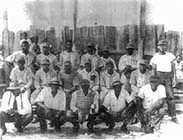
Early African-American baseball team from North Mecklenburg
There was a movie [theater] in Cornelius we’d go to. There wasn’t much fun, you made your fun yourself. [Churches] used to have fried fish picnics and picnics on May Day, ball games, and that was fun. Susie Lowery
Hood Norton and family
I remember asking my mother why did she cooked so much on Sundays. And she said, well if anyone comes by we’ll have enough to share with them. She was from a family of, I think, 7 sisters and one sister had 9 or 10 children. That’s where we could end up on Sundays a lot of the time, out in the country. No matter who came there was always enough food for everybody. She go in and pull out another jar and open it up. I remember them canning. I remember my dad having a small garden and my granddad. My granddad, I remember them killing pigs, killing hogs. Verdie Torrence
We had picnics. We had to be industrious because there was no outlet for us. We were relegated to the east side of the railroad track, so we had picnics and camp meetings. The reason we did this was because we had to have some source of joy and fun to release the anxiety and tensions that we had, and so we had that. And people became entrepreneurs. You soon learned that if you were going to have a picnic, you had to have somebody to sell the fish, hot dogs and drinks, for popcorn and for somebody to take the twenty-five cent photographs. Bee Jay Caldwell
If you want to know more, in the coming weeks, transcripts and copies of the scanned images will be online on the Shared Stories website. We are grateful to all who have been interviewed and who shared their photographs and documents to ensure that these stories are preserved and shared.
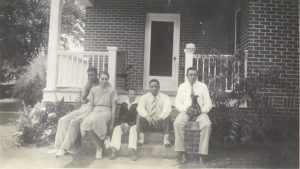

Speak Your Mind